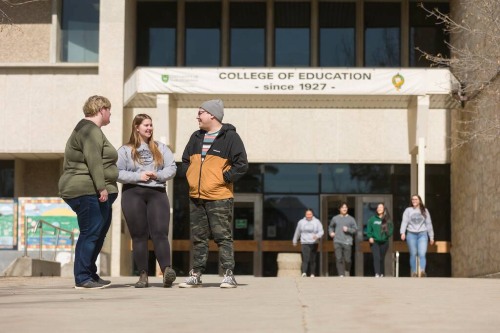Program
The Education (Cross‑Departmental) graduate program at the University of Saskatchewan supports scholars who want to explore complex educational challenges through flexible, interdisciplinary study. Students work across specializations to deepen their research skills and contribute to improved educational practice and policy. Graduates are prepared to advance knowledge and influence meaningful change.
Why choose USask for Cross-Departmental Education?
- Engage in interdisciplinary study supported by the Departments of Curriculum Studies, Educational Foundations, and Educational Psychology and Special Education.
- Work with faculty who offer diverse expertise in educational theory, research, and professional practice.
- Students may take up to six credit units at another Western Canadian university.
Quick facts
-
Expected Length Thesis-based Course-based Ph.D. 4 years - Degree requirements
- Class delivery in-person
- Supervisor approval is required to apply
- Deadlines and admission details below
Leaders in shaping educational research
Forge your path as a scholar committed to strengthening learning, leadership, and community well‑being. At USask, you’ll join a vibrant research community and develop the expertise to reimagine what education can be.
Cross-Departmental Ph.D. in Education

The Cross-Departmental Ph.D. in Education program delivery is intended to be flexible with decisions on program delivery and specific program requirements decided by the student’s advisory committee. Students will be trained in educational research and have support from an advisory committee whose regular members draw expertise from Curriculum Studies (curriculum innovation, early childhood education, English as an additional language, and educational technology and design), Educational Foundations (social and ecological justice education, Indigenous Education), Educational Psychology and Special Education (including applied measurement and program evaluation, special education, and school-based assessment).
The cross-departmental Ph.D. program consists of a minimum of 15 credit units (nine required credit units focused on research methodology, plus six required credit units that support the student’s specific area of research). Students may also take up to six credit units of coursework through another Western Canadian university after a term of study, if these courses are approved as part of their official program of studies.
Please review the following Cross-departmental Ph.D. in Education Information Sheet for more details about the September 2026 intake, the program, admission requirements and application process.
Research supervisors
You are required to identify at least one preferred supervisor in your application (up to three can be identified). The preferred supervisor(s) you identify must be accepting students. You can contact faculty members whose research interests align with your own, and you are required to further elaborate on this alignment in your statement of intent (see application process for details).
Preferred supervisors can be indicated in the ‘Planned Program of Study’ section of your application.
Research supervisors listed below may not all be accepting students at this time. Please refer to Cross-D PhD Research Supervisors for current availability before making contact. Applicants who do not complete the above requirements will not be considered, and the application will be deemed incomplete.
| Name | Research areas |
|---|---|
| Teacher education, Secondary school English language arts, Decolonization, Transformative education, Service learning | |
| Teaching and Learning of Mathematics | |
| Anti-racist/oppressive education, critical race theory, Métis education, critical social/digital media, multi-racial studies | |
| Place-based Pedagogies, Experiential Education, Climate Change and Climate Justice Education, Environmental and Sustainability Education | |
| Learning theory, technology-enhanced learning, instructional design, mobile learning, sociomaterialism, postdigital, and educational technology & social justice | |
| Ecological Literacy, Eco-justice Education, Environmental Education, Arts-Informed Research, and Poetic Inquiry | |
| Mentorship, history of education, history of teacher education | |
| Accessibility and accommodations, assistive technology, special education, inclusive education | |
| AR, VR, XR, AI education, digital literacy, game-based learning, online learning, virtual reality, instructional design, digital well-being, sustainability | |
| Meeting diverse needs individuals varied language/literacy/learning abilities (professional knowledge/early intervention/safe/enabling environments) | |
| Literacies, pedagogies, early elementary education; teacher professional learning | |
| Ethics and Responsibility, Theory & Practice in Science Education, Intersections of 'place, nature, and education', Pre-service Teacher Education. | |
| Statistical modelling in Social and Behavioural sciences, Large scale assessment, Technology and Educational measurement, Educational Psychology | |
| Teacher education, curriculum studies, mathematics education, teacher & children knowledge of school, narrative inquiry, and more | |
| Knowledge synthesis, substance use, resilience, psychopathology, e-learning and program evaluation | |
| Identity; Bilingual/multilingualism in education; Language ideologies and discourse analysis; Critical literacies/pedagogies; Globalization, migration, and language education policy; Decolonizing pedagogies and knowledges; Sociolinguistics and Ethnography; Applied linguistics and TESOL; English as an additional language | |
| Epistemologies, Cross-culturality, Multi-culturalism, Inuit World views, Gender relations, Resilience and Aboriginal peoples | |
| Technology skill development, media literacy, program evaluation, social agency in teaching /learning, experiential learning, design studio learning |
Tuition and funding
Funding
In your application, you should identify your financial status and state if attendance is contingent on receiving financial aid. Students are supported in applying for university funding after acceptance through a limited number of Dean’s Scholarships, non-devolved scholarships, research fellowships, teaching assistantships and research funding. You are encouraged to investigate all options for funding.
Graduate students at USask can receive funding from a variety of sources to support their graduate education.
Tuition and fees
Doctoral program
Doctoral students pay tuition three times a year for as long as they are enrolled in their program. Both international and domestic Ph.D. students pay the same rate.
| Term | |
|---|---|
| September 1 - December 31, 2025 | $1,812.00 CAD |
| January 1 - April 30, 2026 | $1,812.00 CAD |
| May 1 - August 31, 2026 | $1,812.00 CAD |
| Total per academic year | $5,436.00 CAD |
Student fees
In addition to tuition above, students also pay fees for programs like health and dental insurance, a bus pass, and other campus services. The amount you need to pay depends on if you are taking classes full time or part time, and if you are on campus or not. The table below assumes you are on campus full-time.
| Fall 2025 | Winter 2026 | Spring 2026 | Summer 2026 | |
|---|---|---|---|---|
| Student fees | $578.45 CAD | $804.73 CAD | $36.75 CAD | $36.75 CAD |
Tuition information is accurate for the current academic year and does not include student fees. For detailed tuition and fees information, visit the official tuition website.
Admission requirements
Doctor of Philosophy (Ph.D.)
- Language Proficiency Requirements: Proof of English proficiency may be required for international applicants and for applicants whose first language is not English
- Master of Education (M.Ed.) or equivalent from a recognized college or university
- A cumulative weighted average of at least a 75% (USask grade system equivalent) in the last two years of study (e.g. 60 credit units)
Application process and deadlines
Deadlines and important dates
| Canadian and International Students | ||
| Start Term | Application Deadline | Documents Deadline |
| September | November 30 | November 30 |
All applications and supporting documentation must be received by the deadline date. After that date, we will review the completed applications, but not before.
Submit an online application
International students - Master's and doctoral students applying for a study permit do not need a Provincial Attestation Letter (PAL). Certificate and Postgraduate Diploma students, as well as Visiting Research students studying over six months, still need a PAL. Review federal international study permit policies before you apply.
Before beginning your online application, be sure that you have carefully reviewed all program information and admission requirements on this page.
During the application, you'll be asked for:
- Personal information such as your name, address, etc.
- Contact information of your three referees
- For your letters of recommendation, two of your referees must be academic contacts, and the third may be academic or professional
- Your complete academic history from all previous post-secondary institutions
The application takes about 30 minutes to complete. You may save your application and return to it later.
At the end of the application, you will need to pay a non-refundable application fee: $125 for domestic students and $145 for international students. Your application will not be processed until payment is received.
Submit required documents
Once you've submitted your online application, you will have access to upload your required documents, and provide the contact information for your references. To do this, go to the "Supplemental Items & Documents" tab in your application.
Preliminary Statement of Marks
- Once you have submitted your application for admission and paid the application fee, you will be required to upload unofficial PDF copies of your academic transcript(s) from each post-secondary institution attended. This requirement will appear as Preliminary Statement of Marks or Additional Prelim. Statement under admission requirements on your Application Summary when you check your application status.
- The uploaded transcript can be an unofficial copy of the transcript issued by the university or college and must include a grading key/legend.
- All pages of a transcript must be uploaded as a single PDF document.
- Uploaded transcripts will be considered unofficial or preliminary. Official copies of your transcripts will be required only for applicants offered admission. This requirement will appear as Post-secondary Transcript under admission requirements on your Application Summary when you check your application status.
- Transcripts in languages other than English must be accompanied by a certified translation.
For students who are required to provide proof of English proficiency:
- Completing a relevant test with the appropriate score is required before the application deadline.
- Tests are valid for 24 months after the testing date and must be valid at the beginning of the student's first term of registration in the graduate program.
- Applicants will be required to upload a PDF copy of any required language test score. Uploaded test scores will be considered unofficial or preliminary.
You may be required to submit the following documents:
- A statement/letter of intent formatted as a business letter. In a 600 to 800 word letter addressed to the Graduate Chair, College of Education:
-
- Outline your area of research interest and identify faculty in the College of Education who you see as having similar areas of research.
- Describe how your professional and academic background prepares you for the program of study you wish to undertake. We invite you to provide a brief description of your last degree requirements and your motivation for the research you intend to investigate.
- Indicate a proposed timeline for your study. While the Ph.D. program is a full-time graduate program which can be completed in three to four years of full time study, we appreciate that some individuals may have special circumstances i.e. a need to balance professional commitments and school, or may require online and distance learning options.
- A two-page (maximum) Research Statement with bibliography and citations. Your outline should include a research question and provide context, objectives and the methodology for your research. Please describe your intended contribution to the advancement of knowledge in your research area.
- A curriculum vitae or resume. Presentations, publications, academic or professional awards can be listed or presented on a separate page.
Contact

Room 3048, College of Education
28 Campus Drive
University of Saskatchewan
Saskatoon, SK S7N 0X1
Research and Graduate Programs Assistant
Email: edgrad.inquiries@usask.ca
- College of Education
Learn more about the academic unit offering this program - Program and Course Catalogue
To view official admission and program requirements

